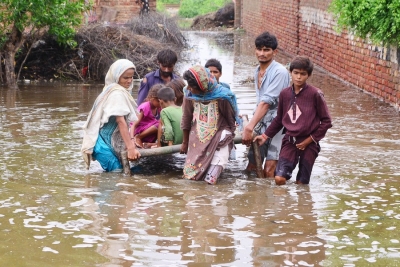By Hamza Ameer Islamabad September 8 : In the wake of the devastating disaster that has submerged one-third of Pakistan beneath water that has been triggered since June of this year, after prolonged heavy monsoon rains that caused flash floods, cloudbursts, and floods across the country.World Health Organisation (WHO) has issued a serious warning about the dire humanitarian situation in the devastated flood-ravaged Pakistan that is straining authorities right now and could get even more dire in the days ahead.
Since the Pakistan government has made an appeal to the world community to provide immediate and urgent relief items to manage the widespread flooding, damages, and relief activities, many countries have extended aid in the form of relief and financial with planes that carry flood relief supplies in order to work with the government in managing the huge humanitarian crisis.
Countries such as China and the United States, France, the United Arab Emirates, Qatar and many more have been sending aid to relief and have launched a massive airlifting operation out of Dubai.
In Pakistan the floods have affected more than 33 million residents with millions of people forced to be evacuated from their towns and homes and walk for long distances through the floodwaters to reach the areas that are growing and then live in tents, open-air and impromptu arrangements.In addition roads, highways railway tracks and infrastructure across the country have been badly damaged by the flooding with over 20 million acres of crop fields completely destroyed.
According to the data of the WHO the WHO, around 1,460 health centres were destroyed, of which at least 432 were completely destroyed most of them in the Sindh province.To take the current crisis in hand, more than 4500 medical camps have been established by the WHO and its partners.
In addition, more than 230,000 rapid tests for acute diarrhoea and malaria, dengue Chikungunya, hepatitis, and malaria are being distributed.
WHO declared that they had already been informed of the existence of illnesses, including Covid-19, HIV and polio.
“We have been informed that these conditions are at risk of becoming more severe,” said WHO spokesperson Tarik Iasarevic.
“We have received reports of an increase of instances of acute diarrhoea with water, measles, typhoid and malaria, with the highest incidence in the most affected areas,” he added.
“This situation is expected to get worse with each day,” said Tarik, saying that the issues are likely to strike areas affected by the floods in a severe way.
Furthermore it is worth noting that the United Nations Human Rights Council (UNHCR) has already ramped the support in Pakistan by the launch of a massive airlifting operation out of Dubai with the goal of helping flood victims in areas in Pakistan which include Sukkur as well as Larkana in Sindh province.
Aid includes at minimum 15,000 sleeping mats , kitchen sets per set and 55,000 tarpaulins with multi-purposes.
United Nations Secretary General, Antonio Guterres is also expected to arrive in Islamabad on September 9 to review and analyze the destruction and damage caused by the floods.
hamza/







